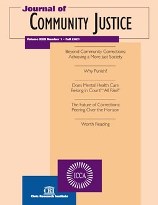Complete Issue
Author: Michael Crowley.
Source: Volume 29, Number 02, Winter 2020 , pp.1-36(36)

< previous article |return to table of contents
Abstract:
In addition to the lead article on Canada’s parole system written by Guest Editor Michael Crowley, this issue of JCC contains two articles that are especially timely for the corrections field, one discussing the current status of medical marijuana use in the court system and a second examining perceived performance differences between state-run community corrections centers (CCCs) and privately operated community contract facilities (CCFs). The issue closes with the Worth Reading column, in which seven recently released books are reviewed by JCC’s book review editor, Russ Immarigeon. Judge Mary Celeste (retired), Christopher Cotter, and Sara Shin discuss the current status of medical marijuana use in the court system by examining developing case law and applicable state and federal legislative schemes. They note that one result of the legalization and decriminalization of marijuana in the United States is that legal medical marijuana use has created a hodgepodge of issues and approaches in drug courts, in diversion and deferred sentencing, and in probation, parole, and pre-trial release decisions and policies. Many of the policies regarding medical marijuana use are in flux in the courts, but some guidelines are beginning to develop as state and appellate case decisions and statutory schemes evolve. Todd Clark uses both quantitative data from electronic surveys as well as qualitative data from interviews to examine performance differences between state-run community corrections centers (CCCs) and privately operated community contract facilities (CCFs) from the perspective of Pennsylvania state parole employees. Survey participants were asked to rate the importance of different performance measures, including access to parolees, staff safety, quality of communication, quality of treatment programs, parolee safety, and reducing recidivism and to rate how well each type of center performs on those measures. For all of the performance measures, CCCs received a higher average score than CCFs. Participants in both the surveys and interviews were also asked to identify how important the cost of housing parolees in each type of center was to them. Both groups indicated that government cost was less important than other performance measures. Russ Immarigeon, JCC’s book review editor, has provided concise and informative reviews of seven recently released books on a variety of topics pertinent to corrections professionals. These include proportionality in punishment, desensitization of those working in the justice system, a media view of the U.S. opioid crisis, crimes of debt, and racial and social stereotyping in criminal justice.Keywords: Parole in Canada; Medical Marijuana Use in Drug Courts, Probation, Parole, and Pretrial Release; Comparing State-Operated and Private Community Corrections Centers
Affiliations:
1: Guest Editor.